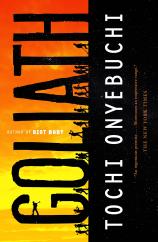Goliath
Review
Goliath
In GOLIATH, Tochi Onyebuchi’s debut novel for adults, a near-future America crumbles under the weight of politicized health crises, environmental catastrophes, and the dual-edged sword of white flight and gentrification.
In the 2050s, America has found itself divided after a viral plague turned political (sound familiar?). Resenting regulations and mandates, many wealthy conservatives have left the country to form America’s first space colony. With the bulk of the country’s funds and resources dedicated to ensuring their safe travel, upper- and middle-class whites have followed, leaving a resource-deficient, polluted and radiation-poisoned ghost country in their wake…not to mention most of the country’s Black and POC citizens, largely disadvantaged and disenfranchised by the country’s racial and political divides.
"Onyebuchi will change the way you think about systemic oppression and the need for resistance. Whether it is with this novel or his next brilliant work, he is sure to leave a lasting mark on the literary world."
As a result, Earth-America has become a sort of Wild West wasteland, marked by its radioactive and cancerous air and home to a generation of the forgotten. Those who remain Earth-bound require a face mask to breathe safely. Even then, deadly illness is almost inevitable unless you are one of the lucky few who live in the Dome, where most residents are already augmented with cyber technology that allows them to filter air, detox their systems and even replace entire organs if necessary. But GOLIATH is not about these residents or the space colonizers who came before them.
Onyebuchi invites readers to New Haven, Connecticut, a “world leader in abandoned buildings, shattered glass, and gas stations without pumps.” While America’s underprivileged (read: mostly Black) citizens have been forced to reckon with the collapsing infrastructure left to them, they also have found themselves targeted by police and rationed resources. As the space colonies run low on materials and high on population growth, entire neighborhoods have been dismantled and sent into space. Left homeless, sick and destined for ruin, Earth inhabitants have grown dependent on anything and everything that lets them forget their grief for even a moment: sex, drugs, even destruction. It seems that life cannot get any worse. Then, discontented with the damage they have already wrought, white space colonists begin returning to the world they abandoned to begin a new era of white flight, gentrification and abuse.
In interwoven, nonlinear chapters, Onyebuchi writes in first-, second- and third-person, alternating between passages that read like classic Westerns, others that almost could be documentaries, and still others that bring to mind the best of literary fiction. We meet a team of “stackers” on Earth whose job it is to tear down houses deemed “uninhabitable” and salvage reusable bricks for the colonies; Jonathan, one half of a gay couple who has come to Earth to create a new life for him and his lover, David; and myriad other characters who have been drawn together by the country’s collapse.
Although Jonathan and David, as gentrifiers, play a huge role in GOLIATH, it is Onyebuchi’s profiles of the various stackers --- lovelorn Linc, preacher Bishop, “Atlanta-ass” Kendrick, resourceful Sydney, and so many more --- that form the emotional heart of the novel. In a world where the systems (racial, carceral, medicinal) and the people who continue to uphold them have become Goliath, an unbeatable adversary, the book celebrates the Davids, the survivors forced to topple their broken society and take back the label of “hero.” It is no surprise that Onyebuchi has applied the metaphor to race, but in doing so he provides readers with some harsh truths about America’s foundation and future.
If this sounds like an incredibly ambitious novel, then you clearly haven’t read Onyebuchi’s previous works, especially RIOT BABY. Without a real central plot to drive the narrative forward and several complicated themes to juggle, the book easily could have been weighed down by the pressure put on every scene to deliver. Yet he succeeds on every page by digging into his characters’ deepest pains and exploring the havoc that grief has raged on their psyche, health and sanity.
With deep emotional resonance, a strong biblical theme and tautly written speculative mechanics, GOLIATH is a real powerhouse of a novel. However, I’d be remiss not to mention its celebration of Blackness: the high-stakes tension of a game of spades, the pure poetry of the lyrics of Pusha T and Kendrick Lamar, the abundant energy of an “Atlanta-ass” story. Too often these elements are cast off as “urban” fiction or, if they find their way into (predominantly white) literary fiction at all, praised for “elevating” the culture (as if it arises from a place so low as to require elevation). But Onyebuchi, with his generous, intellectually layered prose, celebrates all of these details and more, making them near-heroic qualities, signifiers of resistance in a world hell-bent on stomping out culture.
Visceral, urgent and terrifyingly clever, GOLIATH is a prophecy in and of itself. Onyebuchi will change the way you think about systemic oppression and the need for resistance. Whether it is with this novel or his next brilliant work, he is sure to leave a lasting mark on the literary world.
Reviewed by Rebecca Munro on February 4, 2022
Goliath
- Publication Date: January 24, 2023
- Genres: Fiction, Science Fiction
- Paperback: 336 pages
- Publisher: Tordotcom
- ISBN-10: 1250814480
- ISBN-13: 9781250814487




